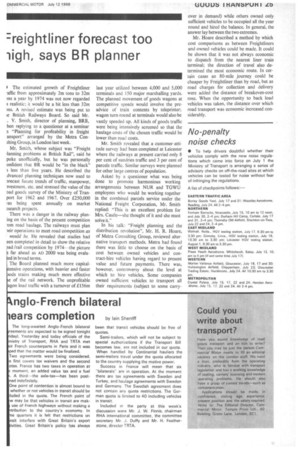nglo-French bilateral
Page 27

If you've noticed an error in this article please click here to report it so we can fix it.
ears completion by lain Sherriff
The long-awaited Anglo-French bilateral reements are expected to be signed tonight iday). Yesterday and today officials of the nistry of Transport, RE-IA and TRTA met ir French counterparts in Pans and it was ped that the matter would be finalized.
Two agreements were being considered. e first covers tax waivers and the second otas. France has two taxes in operation at moment, an added value tax and a fuel A third—the axle-tax—has been postned indefinitely.
One point of contention is almost bound to whether or not vehicles in transit should be tided in the quota. The French point of w may be that vehicles in transit are makuse of French highways without making a tribution to the country's economy. In e quarters it is felt that restrictions on sit interfere with Great Britain's export ivities. Great Britain's policy has always been that transit vehicles should be free of quotas.
Semi-trailers, which will not be subject to special authorizations if the Transport Bill becomes law, are not included in our quota. When handled by Continental hauliers the semi-trailers travel under the quota allocated to the country supplying the motive power.
Success in France will mean that six "bilaterals" are in operation. At the moment there are tax agreements with Sweden and Turkey, and haulage agreements with Sweden and Germany. The Swedish agreement does not contain any quota restrictions. The German quota is limited to 40 including vehicles in transit.
Included in the party at this week's discussion were Mr. J. W. Finnis, chairman FtHA international committee, the committee secretary Mr. J. Duffy and Mr. H. Featherstone, director TRTA.












































































































